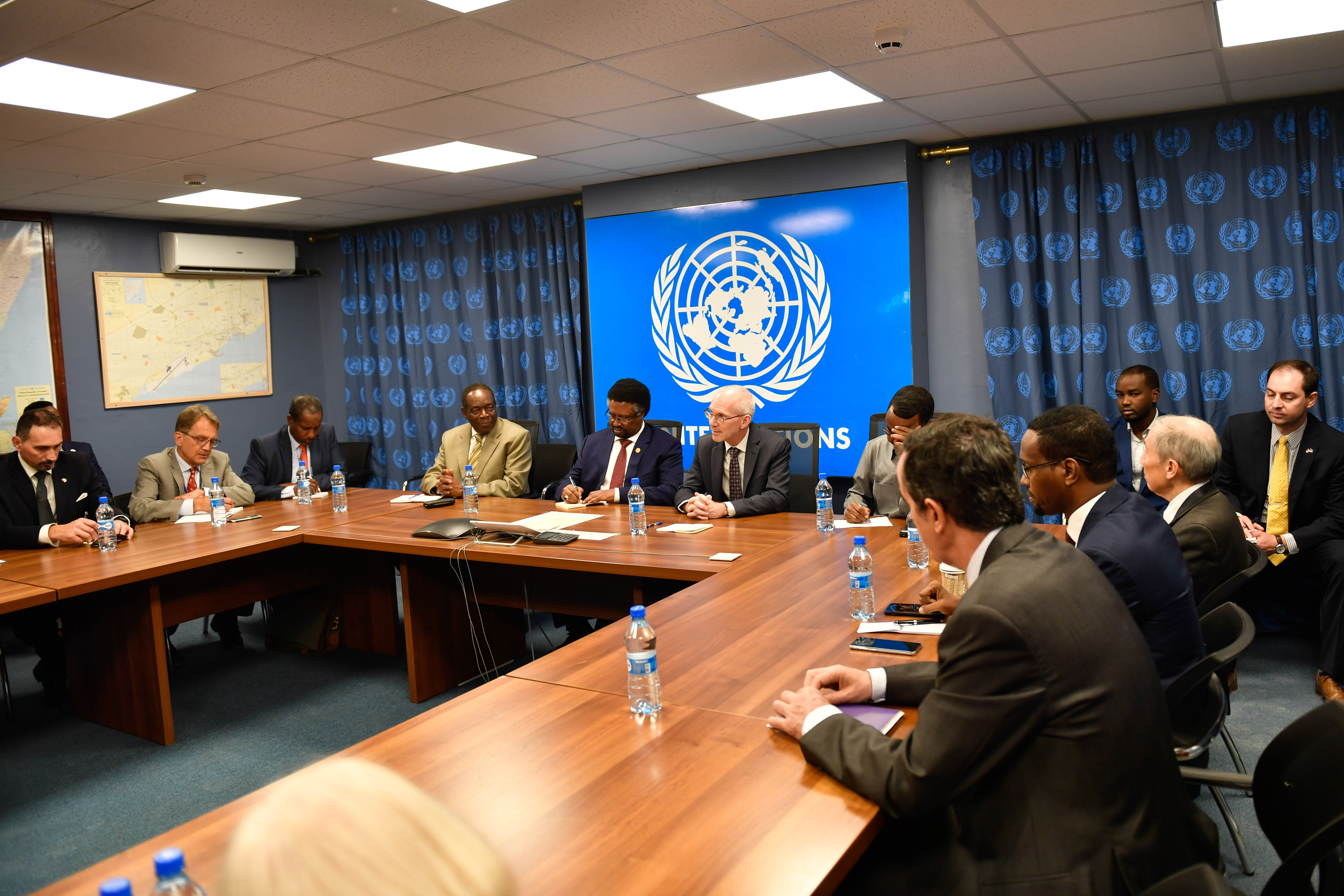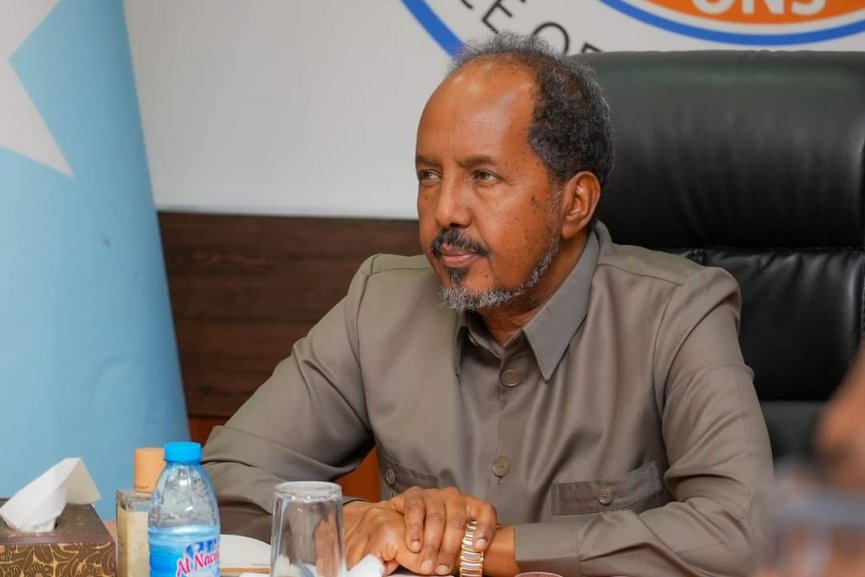
Somalia's Sudden Break with Donor Community: Hassan Sheikh's Flight from Accountability
|
15 June 2025 11:53

MOGADISHU – On June 10, 2025, Somalia's Federal Government did something that stunned diplomats, shocked civil society, and rattled the political establishment: it formally demanded the dismantling of the C6+—an international coordination group composed of key Western and regional actors including the United States, United Kingdom, EU, African Union, Ethiopia, and Kenya.

Announced by State Minister for Foreign Affairs Ali Omar, the move was couched in the language of sovereignty. He described the C6+ as an "obsolete structure,” no longer aligned with Somalia’s needs or aspirations.
But strip away the diplomatic varnish, and a far more troubling reality emerges.
This is not about independence. It’s about insulation.
A Dangerous Message at a Dangerous Time
The decision comes at a perilous moment: less than a year before Somalia’s 2026 elections, with the country divided over how those elections should be conducted—and by whom.
At the center of the storm is the long-promised but still elusive shift to a one-person, one-vote system. President Hassan Sheikh Mohamud’s administration claims to champion this model, but critics accuse it of bulldozing ahead without consensus, sidelining opposition leaders, and ignoring regional concerns.
The national dialogue meant to resolve these differences has stalled. Trust has evaporated. And now, the one international platform still capable of mediating across the divide—the C6+—has been ejected from the room.
"This isn’t reform. It’s retreat,” said a senior opposition figure. "The government is not just rejecting outside interference—it’s dismantling the last guardrails of accountability.”
In the absence of strong domestic institutions, the C6+ played an imperfect but essential role: applying pressure, facilitating mediation, and serving as a diplomatic conscience in Somalia’s fragile political landscape.

PHOTO: Hassan Sheikh Mohamud.
During the 2021–2022 electoral crisis, it was this bloc that helped force a return to dialogue. Its statements, visits, and joint positions mattered—not because they imposed decisions, but because they provided balance in a country where politics too often tips toward brinkmanship.
Now, with that structure cast aside, Somalia risks heading into its most consequential election in years without a neutral referee.
It’s like pulling the fire alarm out of the wall while the building is still on fire.
Sovereignty vs. Spin
Supporters of Villa Somalia frame the decision as a bold stand for Somali sovereignty. They argue the C6+ imposes foreign agendas and that Somalia must now walk its own path.
But critics—at home and abroad—see it differently.
"Sovereignty is not an excuse for power hoarding,” says Hodan Ahmed, a democracy activist in Mogadishu. "If the government truly respected the Somali people’s right to choose, it would build inclusive processes—not dismantle the only external mechanisms capable of encouraging that inclusion.”
In truth, the timing of this move is revealing. With pressure mounting over constitutional changes and increasing questions about whether the upcoming elections will be free and fair, Villa Somalia has chosen to shut out scrutiny rather than engage with it.
This isn’t just about one coordination group. It’s about the kind of country Somalia is becoming—and what kind of leadership it wants to project.
Across the Horn of Africa, democratic backsliding is becoming a trend. From Ethiopia’s shrinking civic space to Sudan’s total collapse, the region is watching as strongmen close ranks and institutions decay.
Somalia is at a crossroads
This government could choose to lead by example—building consensus, inviting oversight, and showing the world that fragile states can still produce strong democracies.
Or it can keep dismantling every mechanism that questions its authority and drift further into isolation, repression, and instability.
Somalia’s international partners now face a dilemma: step back and risk being sidelined—or recalibrate, double down on principled engagement, and find new ways to support civil society, local peacebuilders, and inclusive dialogue.
Meanwhile, domestic actors must ask hard questions. If this government can unilaterally kick out the C6+ today, what—or who—gets sidelined tomorrow?
This is not just a test of diplomacy. It’s a test of democracy. Somalia’s future cannot be built on exclusion. The country needs bridges, not barricades. Dialogue, not decrees. Oversight, not opacity.
The rejection of the C6+ might bring short-term political relief for Villa Somalia. But it risks ushering in a long-term crisis—a vacuum of trust, a collapse of dialogue, and the unraveling of the fragile gains made over the past decade.
The question now isn’t just who will stand with Somalia. It’s whether Somalia’s leaders will stand with their own people. Because if no one’s left at the table, everyone pays the price.
———
Abdirahman Jeylani Mohamed is a journalist and the Director of Arlaadi Media Network. You can reach him on X (Twitter) @JaylaaniJr.
Leave a comment
- Popular
- Rated
- Commented
04/11/2021 - 11:05:02
28/05/2024 - 15:44:10
01/03/2021 - 09:00:37
Opinions
15/06/2025 - 11:53:55
14/06/2025 - 22:05:59
12/06/2025 - 22:33:40
Politics
05/06/2025 - 13:42:50
Terror Watch
14/06/2025 - 22:05:59
07/06/2025 - 21:36:45
Press Releases
14/06/2025 - 11:35:22
12/06/2025 - 22:36:39
 0
0 



































Somalia's Sudden Break with Donor Community: Hassan Sheikh's Flight from Accountability
MOGADISHU – On June 10, 2025, Somalia's Federal Government did something that stunned diplomats, shocked civil society, and rattled the political establishment: it formally demanded the dismantling of the C6+—an international coordin